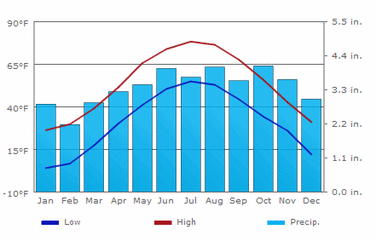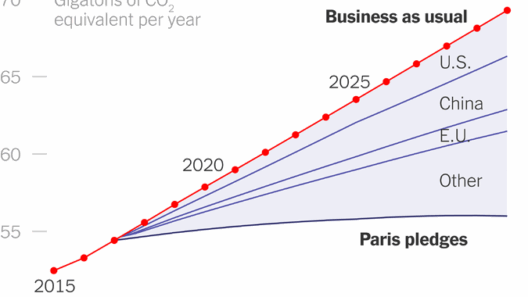The phenomenon of climate change has emerged as an existential conundrum, affecting not only the biosphere but also all humanity. This intricate chain of alterations in climatic patterns is primarily driven by the accumulation of greenhouse gases in the atmosphere, a byproduct of industrial activities, deforestation, and other anthropogenic activities. The repercussions are monumental, influencing weather patterns, sea levels, biodiversity, and human health—across both current and future generations.
1. Altered Weather Patterns
One of the most conspicuous effects of climate change is the alteration of weather patterns. Regions that were once characterized by predictable seasonal changes are now experiencing unprecedented variability. The frequency and intensity of extreme weather events such as hurricanes, droughts, and floods have dramatically surged. For example, the rise in ocean temperatures contributes to more potent hurricanes, while deforestation exacerbates the severity of droughts in many parts of the world. The resulting instability poses significant challenges to agriculture, water supply, and human settlements.
2. Sea Level Rise
The phenomenon of melting polar ice caps and glaciers leads to increased sea levels, which pose a dire threat to coastal cities and island nations. This gradual encroachment of seawater displaces populations, inundates agricultural fields, and compromises freshwater supplies. Low-lying areas such as Bangladesh, the Maldives, and parts of the U.S. are increasingly at risk. The displacement of communities not only leads to loss of homes but also fosters potential geopolitical tensions and humanitarian crises.
3. Impacts on Biodiversity
4. Threats to Food Security
As climate change disrupts agricultural productivity, food security becomes an increasingly pressing issue. Changes in temperature and precipitation patterns can lead to reduced yields and increased pest outbreaks. Staple crops such as wheat, rice, and maize are particularly vulnerable. The intersection of declining agricultural output and growing human populations ensures that food shortages will not be just a distant worry but a near-future reality, particularly in vulnerable regions of the Global South.
5. Human Health Risks
The health of populations across the globe is intricately linked to climate change. Altered weather patterns can facilitate the spread of vector-borne diseases, such as malaria and dengue fever. Additionally, heatwaves and higher temperatures contribute to heat-related illnesses and exacerbate chronic conditions, especially among vulnerable populations. The increase in air pollution from wildfires and industrial activity interface with climate change, aggravating respiratory and cardiovascular problems.
6. Economic Consequences
The economic ramifications of climate change are multifaceted, affecting global markets, trade dynamics, and livelihoods. The destruction wrought by extreme weather events results in costly repairs and rebuilding. Insurance premiums soar, and financial institutions grapple with increased risks. Agriculture, fisheries, and tourism—a trio of significant economic sectors—are all under duress from climatic volatility, threatening the livelihoods of millions.
7. Mental Health Implications
In addition to physical health risks, climate change has been linked to emerging mental health challenges. The anxiety stemming from the uncertainty of future environmental conditions, termed “eco-anxiety,” is becoming increasingly prevalent. Communities affected by natural disasters may grapple with trauma, grief, and loss, leading to long-lasting psychological implications. This aspect underscores the interconnectedness of climate stability and human well-being.
8. Social and Political Unrest
As resources become scarcer due to climate change, social tensions can escalate into conflict. Competitions for water, arable land, and even basic necessities can incite unrest and fuel migration. Nations may find themselves unprepared for the inflow of climate refugees, necessitating comprehensive policies and strategies for integration and support. The interplay between environmental degradation and political instability emphasizes the urgency of collaborative global action.
9. Moving Forward: Solutions and Adaptation
While the effects of climate change are daunting, they do not render us powerless. A paradigm shift in perspective is essential for addressing this multifaceted challenge. Innovations in renewable energy, sustainable agriculture, and resource management can pave the way toward a more resilient future. International cooperation, equitable climate policies, and grassroots movements are pivotal in galvanizing communities worldwide to adapt and mitigate the adverse effects of climate change.
Concurrently, education and awareness are crucial in inspiring action at both individual and collective levels. Promoting sustainable practices, advocating for policy changes, and fostering a sense of stewardship toward the planet can harness the power of informed citizenry in confronting climate change. Through proactive engagement, a more harmonious relationship between humanity and nature is possible.
Conclusion
The effects of climate change encompass a wide array of challenges that threaten not only the environment but also human health, social stability, and economic prosperity. By seeking a deeper understanding of these impacts and embracing innovative solutions, there lies an opportunity to reshape our future. It is imperative for individuals, communities, and nations to unite and confront the climate crisis with urgency and determination. The promise of a healthier planet and a more equitable society rests on collective action and unyielding commitment to sustainability.





